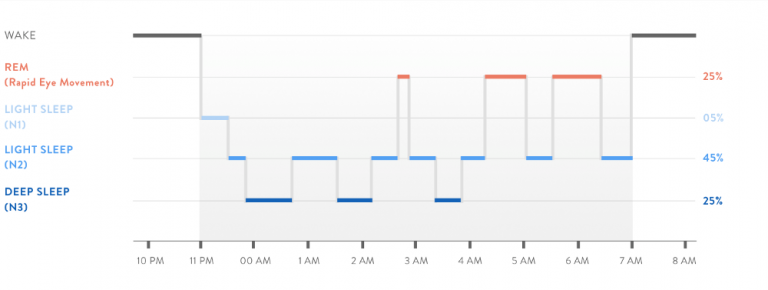Sleep 101

Sleep is one of our basic needs, just like breathing, eating and drinking. It is an active process consisting of two distinct states, Rapid Eye Movement sleep (REM sleep) and non-REM sleep. Non-REM sleep is made up of three sleep stages, N1, N2 and N3. These stages are characterized by changes in brain wave activity patterns as well as how easily a person wakes up, and how deeply they perceive themselves to be sleeping. N1 is very light sleep that serves as a bridge to deeper states of sleep. Most people wake easily from this state and would not believe they had been asleep. N2 is a deeper state of sleep than N1 sleep, most people would believe they had been asleep when woken from N2. Slow wave sleep, or N3, is perceived to be the deepest sleep and it is hardest to wake a person from this stage. REM sleep is when most dreaming occurs, it is characterized by rapid bursts of eye movement, changes in heart and breathing rates, and increased blood flow to the brain.

There are two basic processes that regulate sleep and wakefulness, sleep drive and the circadian rhythm. Sleep drive is the natural process of increasing sleep debt that occurs over the day. The longer a person is awake, the stronger their sleep drive will be, until they go to sleep and their energy reserve is renewed. You may notice this process when you have slept poorly for a few nights and then “crash” and have a good, long sleep.

Circadian rhythm is an internal biological 24 hour “clock” that helps regulate behavior and bodily functions including digestion, body temperature and the sleep-wake cycle. This system sends alerting signals that are stronger during the day and decrease during the night.
For a person to sleep their best, their sleep drive should be at its strongest and their alerting signals at their weakest.
The best ways to keep your circadian rhythm strong is to wake up at the same time every day and expose yourself to light in the morning. Waking up at different times will throw your body into a jet lag like state, not knowing when you should be awake or asleep. This also happens when people try to “catch up” on sleep. It may make you feel better in the short term, but in the long run, you are weakening your circadian rhythm which can lead to sleep difficulties.

Now that you understand the processes that control our sleep, let’s talk about the behaviors you’ll need to change it.
Get up at the same time every day, regardless of how you slept. Waking up at the same time everyday helps strengthen your circadian rhythm. You will create a more stable sleep pattern that will allow you to become sleepy around the same time every night.
Only go to bed when you feel sleepy, but not before the time suggested by your assigned sleep window. Going to bed before you feel sleepy is counter-productive for improving the quality of your sleep. It will increase the time you spend awake in bed, strengthening the association between the bed and being awake, which will worsen your sleep difficulties. (Your sleep coach can help you determine your starting sleep window- the average amount of time you are actually sleeping per night).

Use the bed for sleep only. Avoid doing things in your bed that you do when you are awake. Do not watch TV, play on your phone or tablet, eat, study, work, etc. in your bed. Using your bed for things other than sleep (and sex), strengthens the association between bed and being awake. Consistently avoiding non-sleep activities in the bedroom will help to make your bed a place where it is easy to fall asleep and stay asleep.
Get out of bed if you can’t sleep. Never stay in bed, at the beginning of the night or in the middle of the night, when you are not sleeping. If it has been more than 15-20 minutes and you are awake, get out of bed and do something relaxing. Staying in bed and trying to force sleep can increase feelings of frustration, stress and anxiety which will worsen your sleep difficulties.
Don’t worry, plan, etc. in bed. Often our minds take the time at night when we are in bed to ruminate, process our day, plan ahead, attempt to solve problems, etc. Having a busy mind makes it hard to sleep and can worsen your sleep difficulties. Scheduling time to process your day and plan for upcoming life events can lessen these types of thoughts in bed. Using a mindfulness technique, such as mindfulness of the breath, can also be a good way to address a busy mind.
Do not nap. Napping is like snacking on your sleep! It lessens your sleep drive, which may make it more difficult to sleep at night.
Bonus Sleep Guidelines:
- Make sure your bedroom environment is promoting sleep. Keep the temperature below 68 degrees, have a comfortable bed, and a quiet and dark room.
- Limit your use of caffeine and do not drink caffeine after noon. Limit alcohol use and do not use at least 2 hours prior to bed.
- Exercise regularly, but not close to bedtime.
- Take 2 hours before bed to wind down by focusing on relaxing activities.
- Be aware of your stress level and do your best to address stress when you can.
- Focus on balance in your life. Make time for things other than work (i.e. hobbies, social activities, relaxation, exercise, family time).
Discover your sleeper profile with this sleep test
Start



